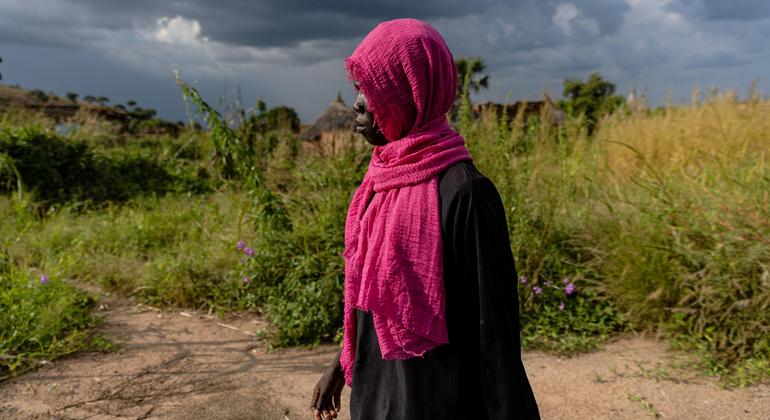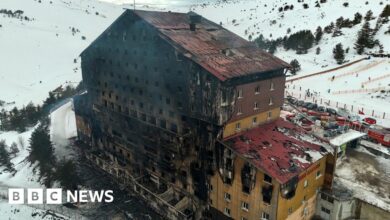Sudan war: Rights inquiry calls for wider arms embargo to end ‘rampant’ abuse


“Since mid-April 2023, the conflict in Sudan has spread to 14 of the 18 states, affecting the entire country and region, leaving eight million Sudanese internally displaced by the conflict, with two million – more than two million – forced to flee to neighboring countries,” said Mohamed Chande Othman, President of the Independent International Investigation Mission on Sudan.
The first findings are worrying
In the first report on the crisis after it was established by the United Nations Human Rights Council In Geneva in October 2023, the council noted that the rival military forces, the Sudanese Armed Forces (SAF) and the Rapid Support Forces (RSF), as well as their respective allies, were responsible for direct, indiscriminate and widespread attacks including airstrikes and shelling on civilians, schools, hospitals, communications networks and vital water and electricity supplies – showing a complete disregard for the protection of non-combatants.
The three independent human rights experts leading the Mission’s work – Mohamed Chande Othman, Chair, Joy Ngozi Ezeilo and Mona Rishmawi – stressed that responsibility for these serious violations lies with “both sides and their respective allies”, many of which could be considered international crimes.
“In particular, we found that both the SAF and RSF were conducting hostilities in densely populated areas, notably through repeated airstrikes and shelling of various cities, including Khartoum and many other cities in Darfur,” Ms. Rishmawi said.
The Courage of the Survivors
Although the Sudanese government refused to cooperate with the Mission after rejecting its mandate, investigators collected firsthand testimony from 182 survivors, family members and witnesses.
Extensive consultations with experts and civil society activists were also conducted to confirm and further verify the clues.
“RSF members in particular have committed acts of sexual violence on a large scale in the context of attacks on cities in the Darfur region and the Khartoum region in general,” Ms. Ezeilo asserted.
“Victims recounted being attacked at home, beaten, whipped and threatened to kill or harm relatives or children before being raped by multiple perpetrators.
They also suffered sexual violence when seeking shelter from attacks or fleeing. We also found evidence of women being forced into sexual slavery after being abducted by RSF members.”
The Horrors of El Geneina
The council’s report also provides insight into “large-scale ethnically based attacks on non-Arab civilians” – and particularly Masalit people – in El Geneina, the capital of West Darfur, an ethnically diverse city of around 540,000 people.
Soon after the war broke out in April 2023, the RSF and allied militias attacked the city, killing thousands, investigators said, in “horrific attacks… torture, rape” and destruction of property and looting were commonplace.
“Masali men were systematically targeted for murder,” the Mission’s report continued. “RSF and allied militias went door-to-door in Masalitan neighborhoods, searching for men and brutally attacking and killing them, sometimes in front of their families.
Lawyers, doctors, human rights defenders, academics, community and religious leaders were apparently specifically targeted. RSF commanders reportedly ordered a ‘search of the city’ and checkpoints were set up everywhere.”
Highlighting the failure of the Sudanese military to protect civilians in cities and refugee camps for those displaced by the war, human rights experts have called on the international community to extend the current arms embargo on Darfur to the entire country. “Cutting back arms and ammunition to the parties, including supplies of new ammunition and weapons, would help slow the appetite for war,” Mr. Othman said.
Peacekeeping forces call for
The investigators also urged the international community to establish a peacekeeping force, under the authority of the United Nations or a regional organization:
“This can be done by the United Nations and already in the neighboring country, in South Sudan, the fact that the United Nations has a mandate to protect civilians in specific countries,” said Ms. Rishmawi. “This can also be done, as we know, by the African Union as well, so regional organizations can actually do that.”
Investigators say law and order in Sudan has deteriorated to the point where children are being drawn into the conflict.
“The SAF is mobilizing and sometimes mobilizing in schools, but Its allied forces recruited children and used children in combat.. And that is where the difference you find in our reporting is. RSF is much more systematic and widespread,” Ms. Rishmawi noted.
She went on to say that “there must be accountability” for this and other crimes, in a call for the establishment of a special court to hold perpetrators accountable for the serious crimes being committed across Sudan with impunity.
“These people need to be held accountable. The fact that they have not been held accountable in previous conflicts is what makes women’s bodies, as a theater of action for this war. This must stop, and the only way to stop it is to have an international judicial mechanism because there is no trust,” she said.
Aid keeps flowing: WFP
United Nations World Food Programme (World Food Programme) in Sudan announced on Friday that The 100-ton truck passed through the important intersection of Adre. on the Chad border.
The agency has monitored more than 1,500 tonnes of essential food and nutrition supplies – enough for nearly 130,000 people – since the border reopened on August 20, UN spokesman Stéphane Dujarric told reporters in New York.
“Some of this support has been directed to Mornei in West Darfur – is a famine-prone area – where more than 22,000 people receive emergency food rations and nearly 4,800 children and pregnant and lactating women received nutritional supplements.
The remainder are en route to other communities in West Darfur, which are also at risk of famine, and these communities are located in the Kereneik and Sirba areas.
“However, the progress of the convoy was slowed down by flooded and muddy roads as the rainy season approached.“, Mr. Dujarric added.



